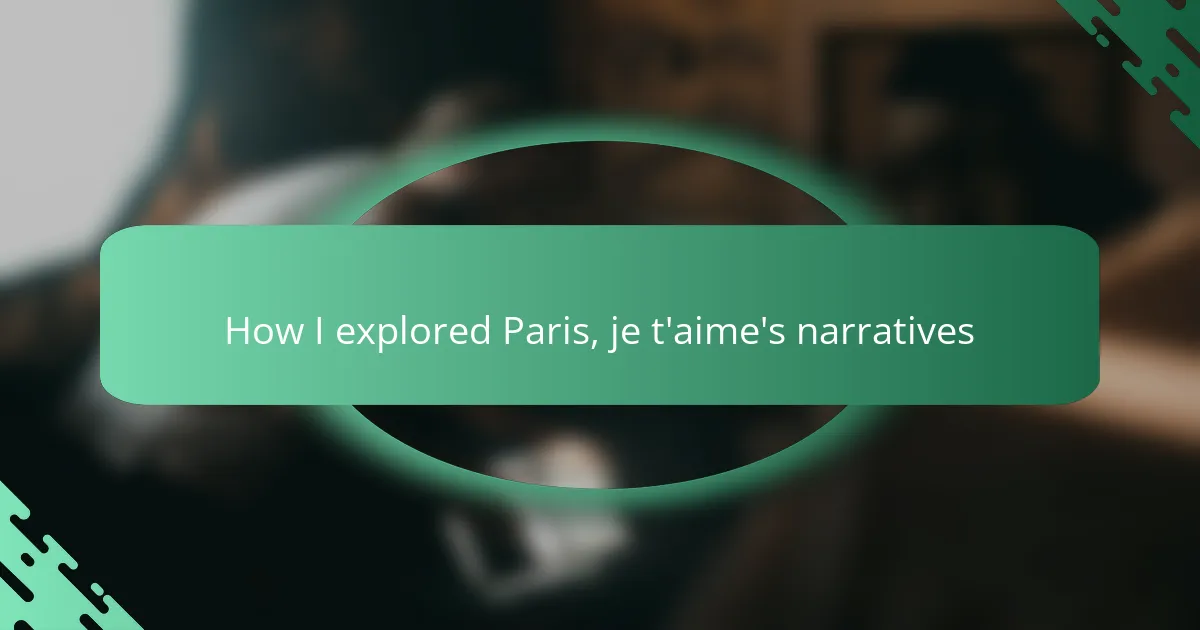Key takeaways
- French cinema, particularly “Paris, je t’aime,” masterfully blends love and identity themes, reflecting cultural diversity within the charm of Paris.
- The film’s non-linear narratives invite viewers to connect emotionally with characters, echoing personal experiences of love and connection.
- Critics and audiences appreciate the anthology format for its exploration of varying love stories that resonate with universal human experiences.
- Visually stunning, French films emphasize artistic expression, contrasting with the plot-driven style often found in Hollywood cinema.
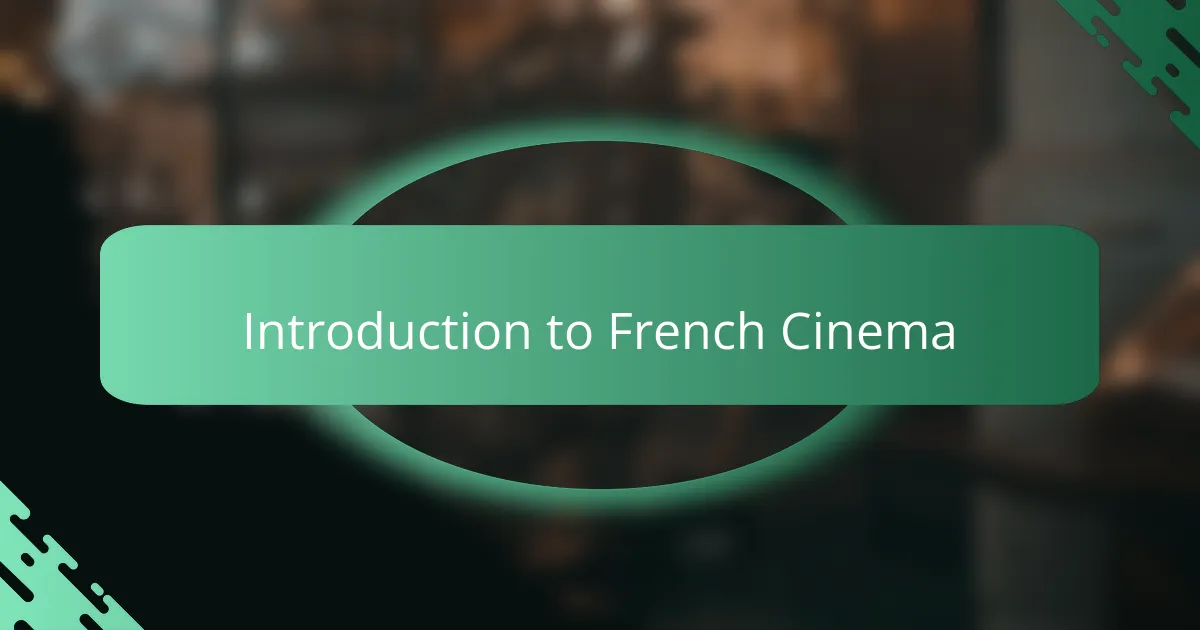
Introduction to French cinema
French cinema holds a special place in my heart, often serving as a window to the world of artistry and romance. From the striking visuals of classic films to the nuanced storytelling of contemporary works, every narrative unfolds like a delicate tapestry. I recall the first time I watched “Amélie”—the quirky charm and the enchanting portrayal of Paris stirred something deep within me, igniting a passion for French films that has only grown since.
One of the most captivating aspects of French cinema is its ability to blend the mundane with the extraordinary. It evolves with society, reflecting cultural shifts while exploring universal themes of love, loss, and the human experience. Whether it’s a heartfelt drama or a whimsical comedy, French films often evoke a sense of nostalgia that resonates with audiences globally.
Here’s a brief comparison that highlights some key characteristics of French cinema compared to other film traditions:
| Aspect | French Cinema | Hollywood Cinema |
|---|---|---|
| Narrative Style | Often non-linear and character-driven | Typically linear and plot-driven |
| Themes | Explores existential questions, love, and societal issues | Focuses on action, heroism, and clear resolutions |
| Visual Aesthetics | Emphasis on artistic visuals and symbolism | Focus on high production values and special effects |
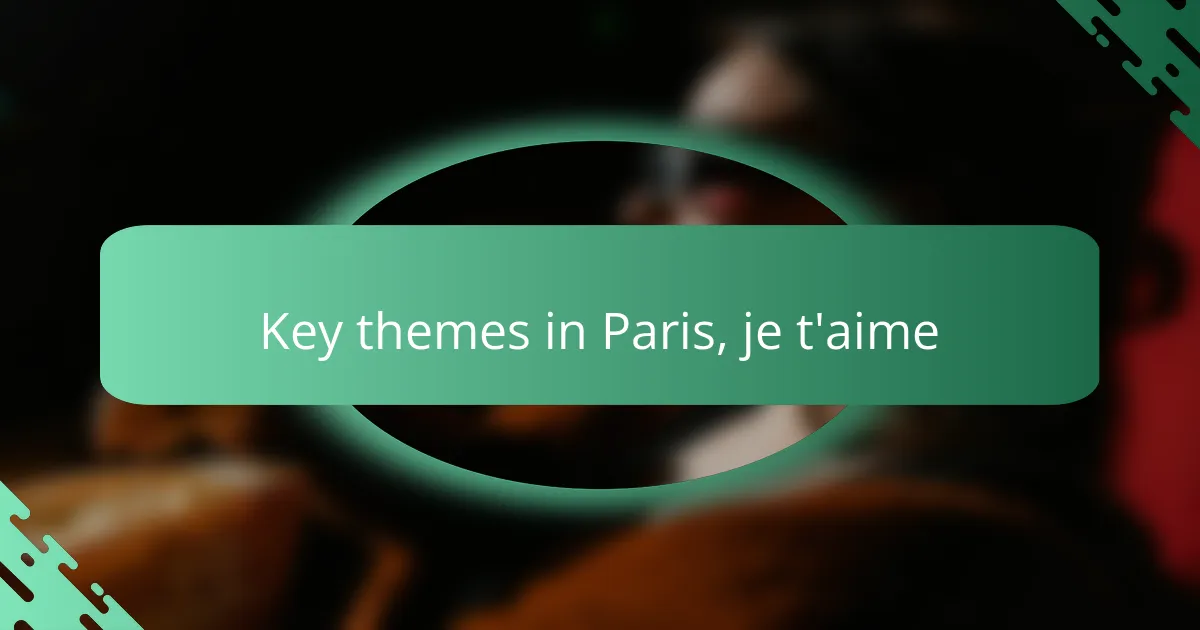
Key themes in Paris, je t’aime
One key theme in “Paris, je t’aime” is love in its many forms. The film beautifully captures the essence of romance, friendship, and familial bonds set against the picturesque backdrop of Paris. Watching it, I was reminded of my own memories of the city, where every corner seemed to echo a story of connection and affection.
Another prominent theme is the exploration of identity and belonging. Each vignette provides a unique perspective on how individuals navigate their personal journeys within the larger tapestry of Paris. I recall feeling a mix of excitement and nostalgia during my own visit, as I wandered through the streets, often pondering my place in the world, much like the characters on screen.
- Love: Romantic, platonic, and familial connections are depicted in various narratives.
- Identity: Characters confront their own sense of self and belonging in the vibrant city.
- Diversity: The film showcases the multicultural facets of Paris, reflecting its eclectic population.
- Transience: Many stories touch on fleeting moments that leave lasting impressions, highlighting how brief encounters can change lives.
- Urban Life: The city itself acts as a character, influencing the actions and emotions of the people who inhabit it.
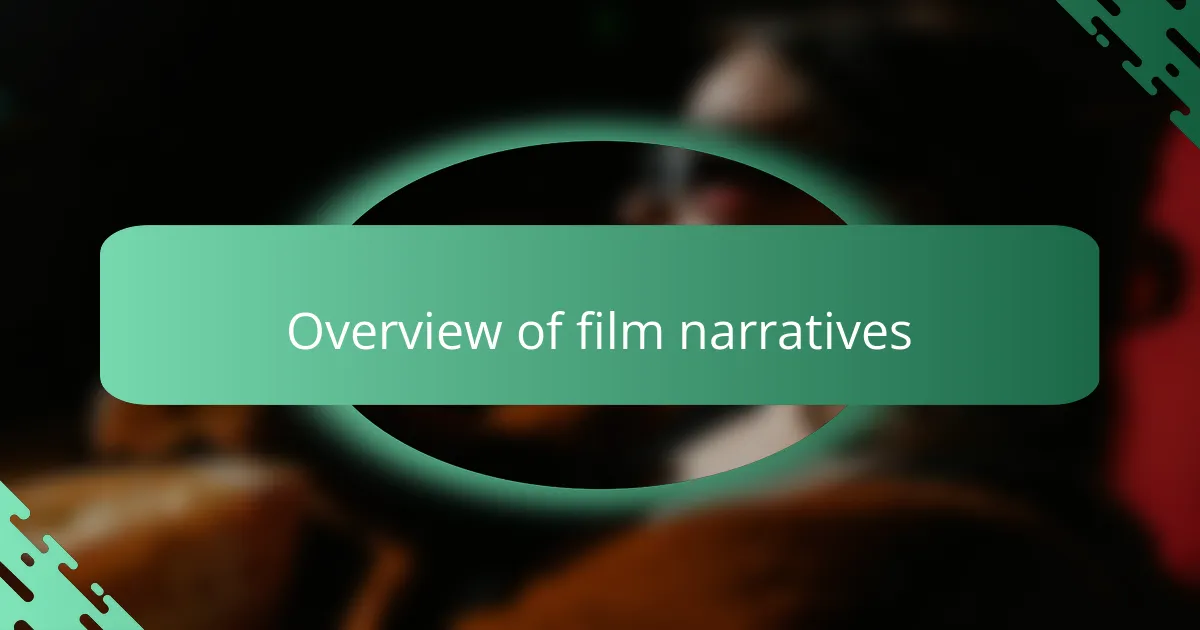
Overview of film narratives
Film narratives encompass a wide range of storytelling techniques that bring the unique vision of a director to life. In French cinema, these narratives often diverge from traditional linear formats, opting instead for a character-driven approach that invites viewers to immerse themselves deeply into the emotional landscape of the film. I often find myself pondering how this style allows for a richer exploration of themes, especially in films like “Paris, je t’aime,” where each vignette unfolds a myriad of human experiences in just a few minutes.
Delving into the heart of these narratives, I find that they resonate on a personal level, tapping into our shared emotions and experiences. In “Paris, je t’aime,” for instance, I was struck by how each story, while distinct, painted a larger portrait of love and connection within the vibrant city. It reminded me of the fleeting moments I’ve experienced in my own encounters—those serendipitous conversations with strangers that linger in my memory long after they happen.
Moreover, the non-linear storytelling often captures the essence of life’s unpredictability. It invites us to reflect on how our own life stories intertwine, much like those depicted on screen. Have you ever watched a film and felt it echo your life in unexpected ways? That profound feeling is one of the magic of film narratives—they allow us to see our own stories reflected back at us, evoking emotions that can be both exhilarating and bittersweet.
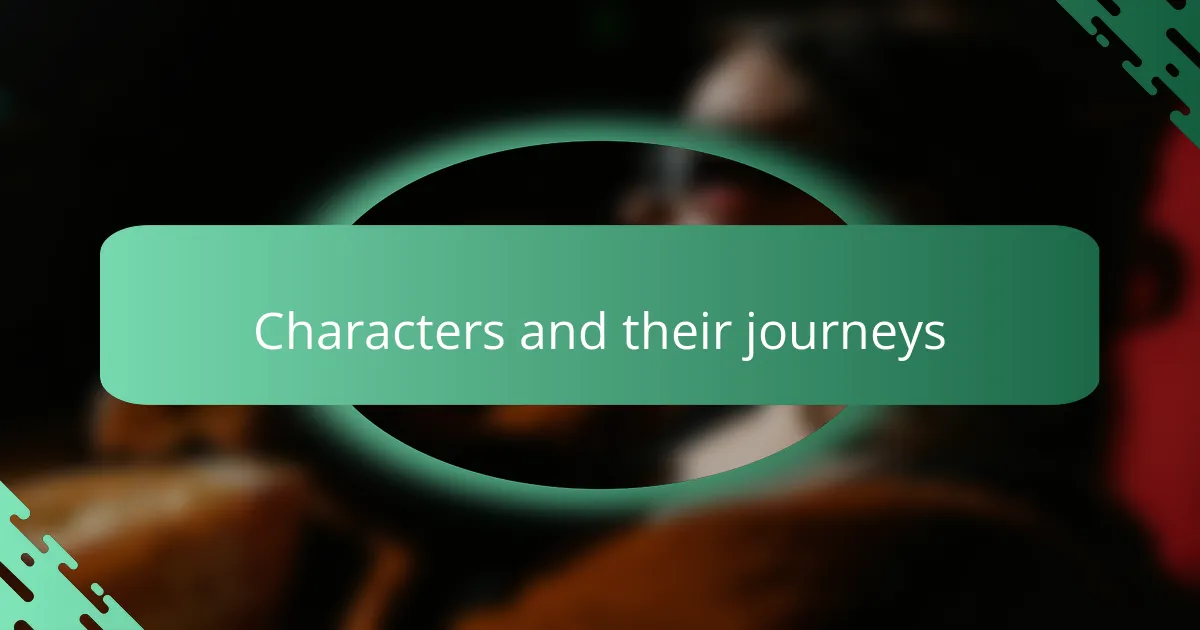
Characters and their journeys
Paris je t’aime presents a rich tapestry of characters, each navigating their unique journeys through the city’s enchanting streets. For instance, one character, an American tourist, discovers love in the most unexpected place—a quaint café in Montmartre. I remember my own moments in Paris, where conversations with strangers turned into profound connections, echoing that sense of unexpected romance.
Another storyline introduces a grieving character who finds solace through the beauty of Paris in the company of an artist. This resonates with my belief that travel often helps us heal, as I too have found comfort in art while exploring new environments. Each character’s journey unfolds as they navigate love, loss, and the vibrant essence of Paris, making it relatable and heartfelt.
Here’s a comparison table that highlights some key characters from the film and their journeys:
| Character | Journey |
|---|---|
| American Tourist | Discovers love in a café, symbolizing hope and serendipity. |
| Grieving Artist | Finds solace through art and the vibrant city, representing healing and renewal. |
| Young Lovers | Explore the challenges of their relationship amidst the backdrop of Paris, showcasing the complexities of love. |
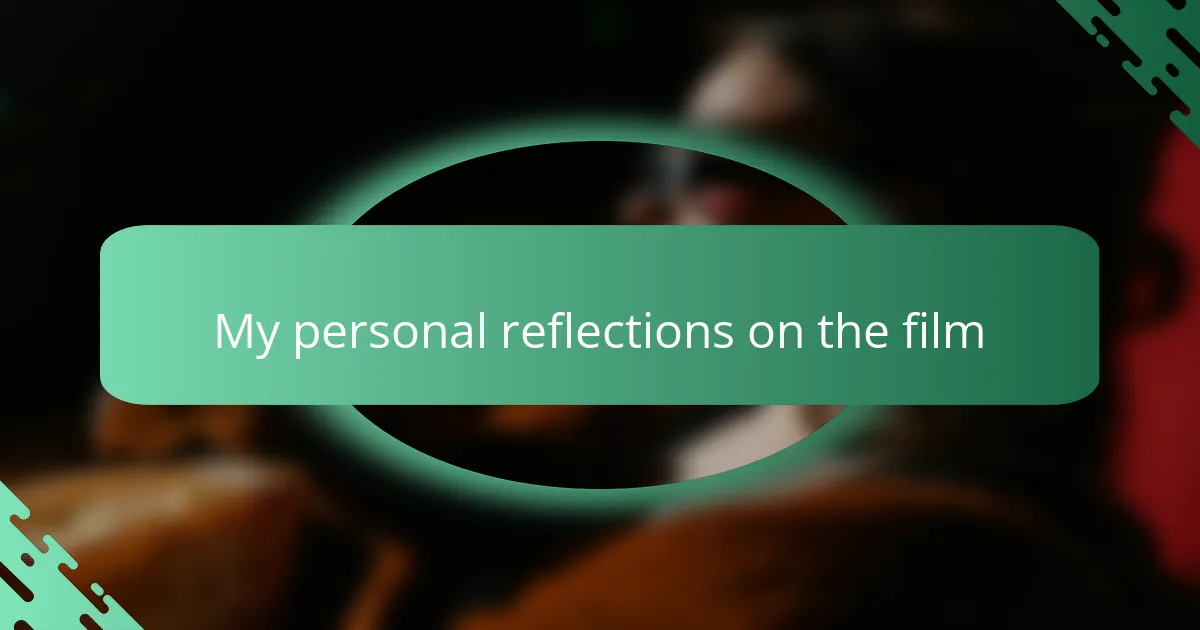
My personal reflections on the film
Reflecting on “Paris, je t’aime,” I’m struck by the way the film showcases love in its myriad forms. Each vignette resonates differently depending on where I am in my own life. I remember my first trip to Paris, how the city’s energy mirrored the passion and heartbreak portrayed in the film; it left me feeling both elated and wistful.
As I watched individual stories unfold, I couldn’t help but relate to the characters’ experiences. Their struggles with connection and longing reminded me of my own adventures in love. The film prompted me to ask: What does love mean in the context of a city that embodies romance? It made me appreciate the little moments—the laughter, the tears, and the fleeting glances—all pivotal to our human experience.
- Love transcends language and culture, just as the film illustrates through diverse stories.
- Each vignette not only represents a unique relationship but also invites us to reflect on our own.
- Paris itself emerges as a character, breathing life into the emotional landscapes of each narrative.
- The emotional depth of the stories stirred memories of my personal encounters in the city, creating a profound sense of nostalgia.

Insights from critics and audiences
Paris je t’aime has received a rich tapestry of insights from both critics and audiences, weaving together their diverse experiences of love and connection in the City of Light. Many critics appreciate the film’s anthology format, emphasizing how each vignette uniquely captures the essence of Paris and the myriad ways love manifests. Personally, I found it fascinating to see how different narratives resonated with viewers, sparking memories of my own trips to the city, where snippets of romance and human connection seemed to mirror those portrayed on screen.
Audiences were particularly drawn to specific stories that evoked strong emotional responses, which is something I deeply relate to. For example, the short film featuring the blind man who experiences love through sound left a lasting impression on many. It reminded me of my visits to Paris, where I sometimes felt overwhelmed by the beauty surrounding me, and it made me ponder how we perceive love in its many forms.
| Critics’ Insights | Audience Reactions |
|---|---|
| Appreciate the anthology format, praising its exploration of diverse love stories. | Touched by personal narratives that resonate with their own experiences. |
| Highlight the artistic cinematography that captures Paris’s essence. | Relate emotionally to stories that evoke nostalgia and longing. |
| Recognize the film’s cultural significance in portraying contemporary Paris. | Celebrate the feel-good moments, often sharing their favorite segments. |
